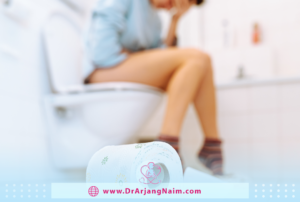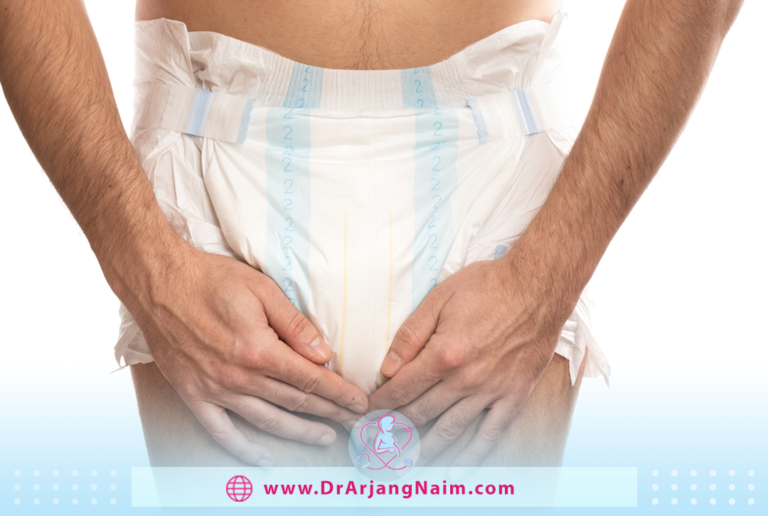Fecal incontinence is the accidental loss of solid or liquid stool. It can occur when a person suddenly has the urge to defecate and is unable to get to the toilet in time. Stool may also leak when a person does not need to defecate.
Common causes of fecal incontinence include diarrhea, constipation, and muscle or nerve damage. Fecal incontinence can affect a person’s ability to work, socialize, or perform normal daily activities. It often causes embarrassment or emotional distress.
Bowel or fecal incontinence can range in severity from passing a small amount of stool when passing wind to complete loss of bowel control. It is not life-threatening or dangerous, but it can affect a person’s quality of life, emotional and mental health, and self-esteem.
Many people do not report bowel incontinence because of embarrassment and the mistaken belief that it cannot be cured. Many believe that it is an inevitable part of the aging process. In some cases, bowel incontinence resolves on its own, but it usually requires treatment.

Types of fecal incontinence
Fecal incontinence is a condition where a person cannot control their bowel movements, leading to the accidental leakage of stool. There are two main types:
- Urge incontinence: This is the most common type. It occurs when a person experiences a sudden, strong urge to have a bowel movement but cannot control it until reaching a toilet. This can be caused by weakened pelvic floor muscles, nerve damage, or other conditions.
- Passive incontinence: This type occurs when a person leaks stool without any warning or sensation. It is often caused by damage to the nerves or muscles that control the rectum and anus.
Other less common types of fecal incontinence include:
- Functional incontinence occurs when a person cannot reach the toilet in time due to a physical or mental condition.
- Overflow incontinence: This occurs when the rectum becomes overly full, causing stool to leak out.
- Mixed incontinence: This is a combination of urge and passive incontinence.
It is important to see a doctor if you are experiencing fecal incontinence. They can help you determine the underlying cause and recommend the best treatment options.

Symptoms
Bowel incontinence may be a short-term problem or a problem that happens regularly. You may suddenly feel the urge to use the bathroom or not realize you need to go. Bowel incontinence may be associated with other bowel problems, such as:
- Loose, watery stools
- Trouble passing stools or irregular bowel movements
- Bloating and gas
What causes fecal incontinence?
The most common causes of fecal incontinence include constipation, diarrhea, and conditions that damage the muscles or nerves that help with stool. Previous surgeries and procedures can also play a role.
Diarrhea
Loose, watery stools are much more challenging for the muscles to hold in than hard stools. Over time, frequent diarrhea can weaken the muscles of the rectum and anus.
Constipation
Repeated bouts of constipation can weaken the muscles of the anus. Straining to pass stool can cause nerve damage. With chronic constipation, the liquid parts of the stool can leak around the hard stool that is stuck, leading to incontinence.
Muscle damage
Muscle damage can occur during difficult vaginal births when doctors have to use forceps or a small incision to create a larger opening for the baby to come out. Surgery in the anus or rectum (such as surgery to remove hemorrhoids or treat an abscess or fistula) can also cause muscle damage, leading to incontinence.
Nerve damage
Many things that can damage muscles, such as surgery and difficult vaginal birth, can also damage the nerves that control their movement. This includes the nerves that control “rectal sensation,” the signal that tells you it’s time to have a bowel movement. Several chronic conditions that affect your nerves increase your risk of fecal incontinence. Overuse of laxatives can also damage these nerves.
Inability to stretch the rectum
The muscles in your rectum need to stretch to help you hold in your stool. If they’re not elastic enough, stool can leak out. Conditions and procedures that cause scarring can prevent the rectum from stretching. Scar tissue isn’t as stretchy as healthy tissue. For example, Crohn’s disease can lead to scarring that prevents stretching, and radiation therapy can also cause scarring.
Pelvic organ prolapse (POP)
POP is when weak pelvic muscles can’t fully support your pelvic organs. These organs include the rectum, vagina, uterus, and bladder. As a result, the organs slip or hang down. Rectal prolapse occurs when the rectum drops into the anus. Rectocele occurs when the rectum slides down the back wall of the vagina. Both forms of prolapse can lead to fecal incontinence.
Risk factors for fecal incontinence
Fecal incontinence is the involuntary loss of bowel control, and several factors can increase your risk:
- Age: This risk increases with age, especially over 65, as muscle weakness and nerve damage become more common.
- Childbirth: Women who have given birth, especially by vaginal delivery or those who are pregnant with multiples, are at higher risk.
- Nerve damage: Conditions such as spinal cord injuries, stroke, diabetes, multiple sclerosis, and Parkinson’s disease can damage the nerves that control bowel function.
- Muscle weakness: Weakening pelvic floor muscles due to age, childbirth, or surgery can contribute to incontinence.
- Constipation: Chronic constipation can strain the pelvic floor muscles and damage the nerves, increasing risk.
- Diarrhea: Frequent loose stools can overwhelm your body’s ability to control bowel movements.
- Surgery: Some surgeries, especially those in the pelvic area, can damage the nerves or muscles in bowel control.
- Obesity: Being overweight can put more pressure on the pelvic floor muscles.
- Medications: Some medications, such as those for high blood pressure or depression, can have side effects that cause diarrhea or constipation, increasing the risk of incontinence.
Complications
Complications of fecal incontinence may include:
- Emotional distress. Many people are embarrassed by fecal incontinence and often experience anxiety or depression. They may try to hide the problem and avoid social situations.
- Tissue irritation. The skin around the anus is delicate and sensitive. Frequent contact with feces can lead to pain and itching. Sores called ulcers may appear in the tissues of the rectum.
Diagnosis and tests
Diagnosing fecal incontinence involves a combination of steps.
Medical history and physical exam
- Detailed medical history: Your doctor will ask about your symptoms, including how often they occur, the type of stool (loose, solid), and any associated conditions (constipation, diarrhea).
- Physical exam: This may include a digital rectal exam to check for abnormalities in the rectum and anus.
Tests
- Anorectal manometry: This test measures the pressure within the anus and rectum to assess the strength of the sphincter muscles and how well they contract and relax.
- Electromyography: This test measures the electrical activity of the muscles in the anus and pelvic floor.
- Pudendal nerve test: This test evaluates the function of the pudendal nerve, which provides sensation to the perineum (the area between the anus and genitals).
- Ultrasound: This imaging technique can help visualize the pelvic floor muscles and identify abnormalities.
- MRI (Magnetic Resonance Imaging): This advanced imaging test can provide detailed images of the pelvic floor muscles and nerves.
- Colonoscopy or sigmoidoscopy: These procedures allow the doctor to examine the inside of the rectum and colon for any underlying conditions contributing to incontinence.
Prevention
Depending on the cause, improving or preventing fecal incontinence is possible. These measures may help:
- Reduce constipation: Increase your exercise, eat high-fiber foods, and drink plenty of fluids.
- Control diarrhea: Avoid foods or drinks that may worsen diarrhea, such as caffeinated beverages, alcohol, dairy products, and fatty foods.
- Don’t strain. Straining during bowel movements can eventually weaken the anal sphincter muscles or damage the nerves.
Treatments
Fecal Incontinence is usually treatable and can often be completely cured. Recommended treatments vary depending on the cause. Often, more than one treatment may be needed to control symptoms. Non-surgical treatments are often recommended as the first line of treatment for bowel incontinence.

Diet
These steps may be helpful:
- Eat 20 to 30 grams of fiber daily (it can make stools bulkier and easier to control).
- Avoid caffeine (it helps prevent diarrhea).
- Drink several glasses of water each day (helps prevent constipation).
Medications
These medications reduce the number of bowel movements and the urge to have a bowel movement:
- Imodium
- Lomotil
- Hyoscyamine
- Methylcellulose (can help make loose stools firmer and easier to control).
Other medications may also help people with a specific cause of diarrhea, such as inflammatory bowel syndrome.

Exercises
Start a program of regular contractions of the muscles used to control urine flow (Kegel exercises). This builds strength in the pelvic muscles and may help reduce bowel incontinence.
- Bowel training: Schedule bowel movements at specific times each day.
- Biofeedback A sensor is placed inside the anus and on the abdominal wall. It provides feedback when a person does exercises to improve bowel control.
Surgical treatments
Surgery may be recommended for people whose bowel incontinence is not helped by non-invasive treatments. Types of surgery include:
- Sphincter surgery
- Sacral nerve stimulator
- Sphincter cuff device
- Colostomy
Newer non-surgical methods
There are newer, non-surgical methods for treating bowel incontinence, such as:
- Radiofrequency ablation: A probe that goes into the anus directs controlled amounts of heat energy to the anal wall. Radiofrequency ablation causes mild damage to the sphincter muscles, which thicken as they heal.
- Injectable biomaterials Materials such as silicone, collagen, or dextranomer/hyaluronic acid can be injected into the anal sphincter to increase its thickness and function.
These procedures can reduce bowel incontinence in some people without the risks of surgery. Because they are relatively new, their long-term effectiveness and safety are not as well-known as other treatments.
The bottom line
Fecal incontinence is the involuntary loss of bowel control that impacts quality of life. Common causes include constipation, diarrhea, nerve damage, and muscle weakness. Treatment options range from dietary changes and medications to exercises and, in some cases, surgery. If you experience fecal incontinence, consult a doctor for proper diagnosis and management.
Additional questions
- What are the diseases of the bladder?
Some bladder conditions include:
- Bedwetting
- Cystitis (bladder infection)
- Bladder stones
- Overactive bladder
- Paruresis (shy bladder syndrome)
- Urinary incontinence
- Cystocele
- Bladder polyps
- Bladder cancer
- What is the latest treatment for fecal incontinence?
Artificial bowel sphincter implantation has become a viable option for patients with end-stage fecal incontinence who have not been successful with conventional treatment.
- Can muscles recover from nerve damage?
Muscles can recover from nerve damage through a combination of nerve regeneration, where the damaged nerve regrows, and muscle re-education through physical therapy. However, the extent of recovery varies greatly depending on factors like the severity and type of nerve damage, its location, and the individual’s overall health.
- What foods cause very hard stools?
- Processed foods
- Red meat
- Dairy products
- Foods high in saturated and unhealthy fats
- What foods cause diarrhea?
- Spicy foods
- Fatty or greasy foods
- Dairy products
- Artificial sweeteners
- High-fiber foods
- Caffeine and alcohol
Reference
https://www.mayoclinic.org/diseases-conditions/fecal-incontinence/symptoms-causes/syc-20351397
https://my.clevelandclinic.org/health/diseases/14574-fecal-bowel-incontinence
https://www.hopkinsmedicine.org/health/conditions-and-diseases/understanding-fecal-incontinence
https://www.webmd.com/digestive-disorders/bowel-incontinence




